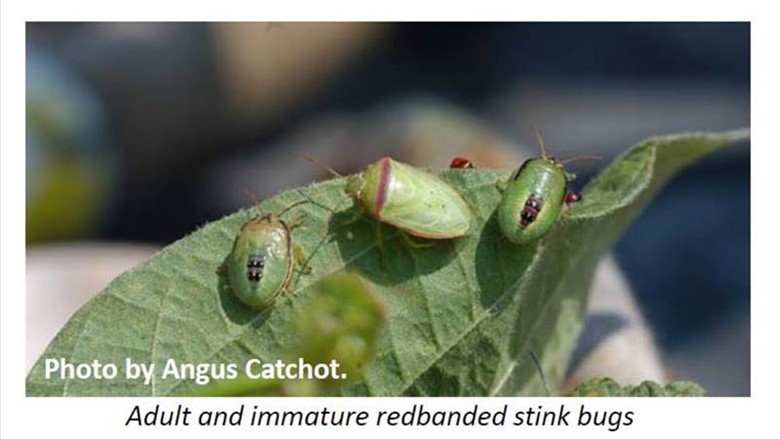Rome Ethredge, Interim UGA Grains and Soybean Agronomist
Most soybeans either have been or are currently being harvested. Soybeans left in the field now were planted later, mostly after small grain or corn harvest (ultra-late). If you have soybeans still in the field, be on the lookout for redbanded stink bugs, and develop a plan if you intend to use desiccants.
–
Insects to Watch
Redbanded stink bugs are a dangerous pest of soybeans and have been seen in a couple fields this week that needed treatment although leaves were already beginning to yellow. Dr. Phillip Roberts with UGA says that this bug affects beans until R7, which is the beginning maturity stage where at least one pod per plant, is a mature brown or tan color and seed pods are full (not just a few plants in stressed areas of the field). Leaves are now yellowing and about half the leaves have dropped. Contact your local extension agent for treatment options. These are harder to kill than other stinkbugs and their threshold is half that of other stinkbugs. For more information or images of the red banded stink bug and its life stages, check out the UF/IFAS publication on this insect: Redbanded Stink Bug
–
Soybean Desiccation
Desiccation of early soybeans started a few years ago, due to them being mature during a rainier time of year and needing to get them out during a busy time. Some of the varieties also seemed more susceptible to problems, if not harvested quickly. Desiccating full season and other beans can be done, and may help to dry the plants out to get them through the combine more efficiently and speed up harvest overall. Desiccation may even help with green stem problems.
Most of these comments pertain to using Paraquat as a desiccant, reference the soybean section of the UGA Pest Management Handbook for information concerning use of other chemistries. One issue is that you need to be ready to combine within a few days to keep from losing beans, but remember that paraquat has a 15 day PHI. Another problem is if desiccation is done too early you can still have green color in the beans at harvest and these are sometimes refused by the buyers. It is best to spray after plants have reached the R7 stage, take a moisture test of beans from top 4 nodes to see that they are 40% or less.
- Don’t Ignore Cow Size When Comparing Calf Weaning Weights - January 9, 2026
- Federal Estate Tax and Gift Tax Limits Announced For 2026 - December 19, 2025
- Why Do I Have So Many Open Cows? Causes of Reproductive Failure - December 19, 2025

